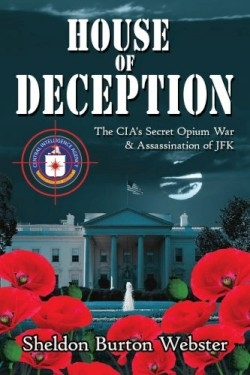House of Deception
The CIA's Secret Opium War and Assassination of JFK
Not nearly as fictional as the Warren Commission report, House of Deception places the blame for President Kennedy’s death squarely at the door of the Skull and Bones society and its members within the CIA. The subject matter is ambitiously broad, stretching from the oval office to New Orleans, Dallas to Saigon to the Golden Triangle. In 1963 Kennedy wants to construct pragmatic policies of détente. He believes the FBI, and especially the CIA, are clubhouses for uncontrolled rogues and seeks to rein them in. After the debacle of the Bay of Pigs, Bonesmen conspirators decide to give an equally ethics-free Lyndon Johnson a promotion. Johnson is only too happy to cooperate.
Opium serves as glue between intelligence officers and the Mafia. Staggering profits fund other covert initiatives and produce untraceable private fortunes. Rotating action introduces a plethora of characters quickly, but the need for a scorecard abates within a few dozen pages as the primary story lines emerge. The most compelling character is Holly Woodson, a BBC correspondent in Saigon. She whitewashes the CIA’s egregious violations of international law, including the Gulf of Tonkin incident. At first her job is a semi-innocent lark, but later she fears her handlers: “…once you’re on the CIA’s leash, it is a permanent or terminal affair.” Holly shows disconnection from reality, entertaining picket-fence delusions about amoral spooks known as Casanova and Mr. Coup.
The author’s weakness is a tendency to overload dialogue with facts. At times his approach seems journalistic. Webster integrates multiple recurring devices: spies who quote Alice in Wonderland, overt and subtle borrows from Graham Greene’s classic The Quiet American, the curious practice of “sheep-dipping,” which dooms Lee Harvey Oswald, Casablanca‘s wartime exoticism, the paranoid-for-good-reason atmosphere of Oliver Stone’s JFK. Fact and supposition are blended as in James Ellroy’s notable novel on the same topic, American Tabloid, although the style here is anything but telegraphic.
Sheldon Webster, a CPA who applies four decades of forensic accounting expertise in his research, has three previous works, including the short story collection Bethheaden Road. Preparation for this book involved world travel, direct interviews with retired military and intelligence officials from the United States and Southeast Asia, as well as traditional library research. Editorial assistance came from Lawrence E. Wilson, Carl “Doc” Kirby and Alice Helms. This book follows the action of its predecessor, House of Sugar and leads into a planned sequel, entitled House of Kampuchea.
Members of secret societies and the handful of people who still believe the Magic Bullet theory won’t find much to like. As with all other works of “faction,” readers will naturally wish to sort out the “true” events by referencing the bibliography the author has incorporated into the Author’s Notes. Check it out and form your own opinion.
Reviewed by
Todd Mercer
Disclosure: This article is not an endorsement, but a review. The publisher of this book provided free copies of the book and paid a small fee to have their book reviewed by a professional reviewer. Foreword Reviews and Clarion Reviews make no guarantee that the publisher will receive a positive review. Foreword Magazine, Inc. is disclosing this in accordance with the Federal Trade Commission’s 16 CFR, Part 255.

